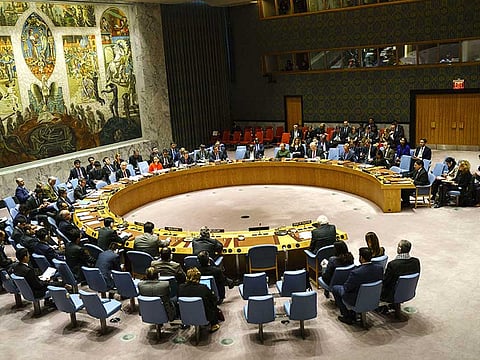Unified UN Jerusalem vote shows US isolation
Overwhelming message from other Security Council members was criticism of Washington

United Nations: Punctuating America’s increasing international isolation, the UN Security Council demanded on Monday that the Trump administration rescind its decisions to recognise occupied Jerusalem as Israel’s capital and to put the US Embassy there.
The demand, in a resolution that its backers knew would likely offend the United States, was vetoed by the US ambassador, Nikki R. Haley. She was alone.
Even America’s staunchest allies on the 15-member council, the most powerful body in the UN system, voted for the resolution.
They warned that President Donald Trump’s December 6 announcement about occupied Jerusalem, which upended decades of US policy, threatened to subvert the effort to solve one of the world’s most intractable conflicts.
Ignoring the ostracism, Haley chastised fellow council members after the midday vote, calling it “an embarrassment” and arguing that Trump’s decision two weeks ago was a “US recognition of the obvious”.
Any suggestion that the Trump administration’s decision had harmed the peace process was “a scandalous charge,” she said, noting that it was the first time in six years that the US had used its veto power in the council.
“Today, for the simple act of deciding where to put our embassy, the United States was forced to defend its sovereignty,” she said. “The record will reflect that we did so proudly.”
The one-page resolution, drafted by Egypt, reiterated the long-standing position of the Security Council, in several resolutions dating back 50 years, rejecting Israel’s sovereignty claim over occupied Jerusalem.
Without identifying the US by name, the resolution also reiterated the council’s view that no country should establish an embassy in occupied Jerusalem, and that the city’s status was an issue to be resolved by Israel and the Palestinians, who want occupied eastern Jerusalem to be the capital of a future Palestinian state.
Critics said that in seeking to reward his political base at home, the president potentially sacrificed stability in the Middle East.
Since the announcement, violence in the region has escalated, leading to the deaths of several Palestinians.
Israel seized eastern Jerusalem in the 1967 Arab-Israeli war and has declared the entire city to be its eternal and undivided capital. Disagreement over the city’s status has been a central impediment to peace in the region ever since.
Already there are signs that Trump’s decision has eroded the ability of the United States to act as an impartial arbiter in the peace process.
Riyad H. Mansour, the Palestinian ambassador to the UN, told the Security Council that the Trump administration’s decision on occupied Jerusalem reflected its “glaring bias” towards Israel and had “undermined its role in any future peace process”.
A month before Trump’s inauguration, Michael T. Flynn, then the transition team’s national security adviser, contacted several foreign officials at the behest of Trump’s son-in-law, Jared Kushner, urging them to delay or block a vote on a Security Council resolution that condemned Israel’s construction of colonies, according to emails of transition officials provided or described to The New York Times.
The Obama administration abstained from voting on the measure, allowing it to pass 14-0, in what was seen as a pointed rebuke of Israel by its US ally. Netanyahu and his allies were outraged.
In remarks before the Monday vote, Haley recalled that abstention last year, describing it as “a stain on America’s conscience”. Given a chance to vote again, she said, the US would have vetoed that resolution.
The overwhelming message from other Security Council diplomats in the vote on Monday was criticism of the United States, even from strong allies like France and Britain.
Matthew Rycroft, the British ambassador, called the Trump administration’s Jerusalem stance “unhelpful to the prospects for peace in the region”.



